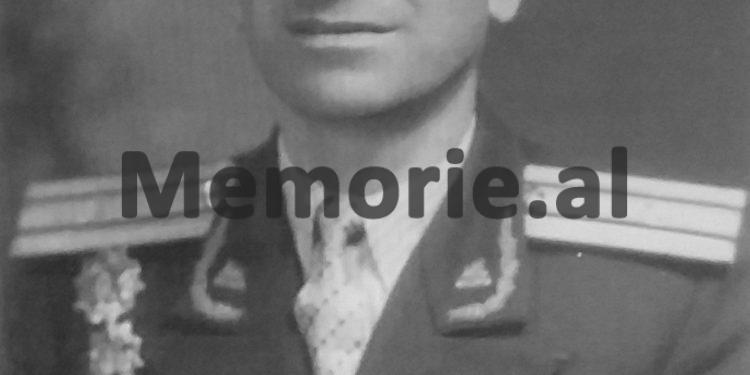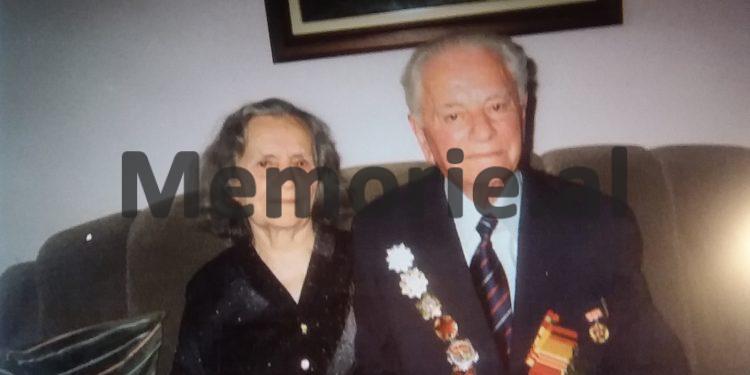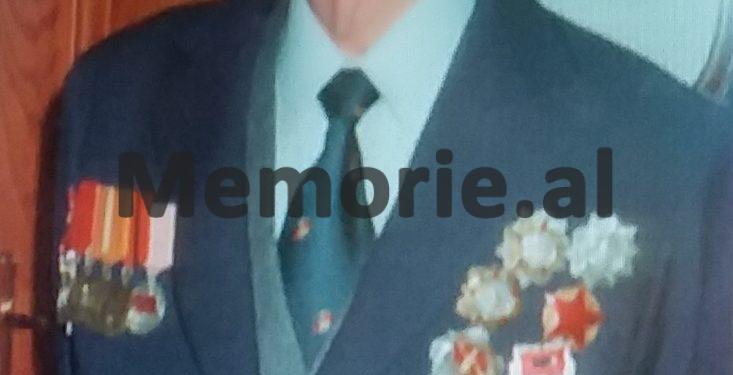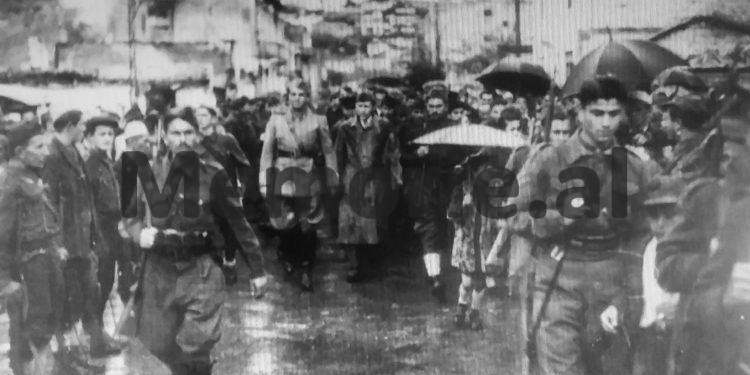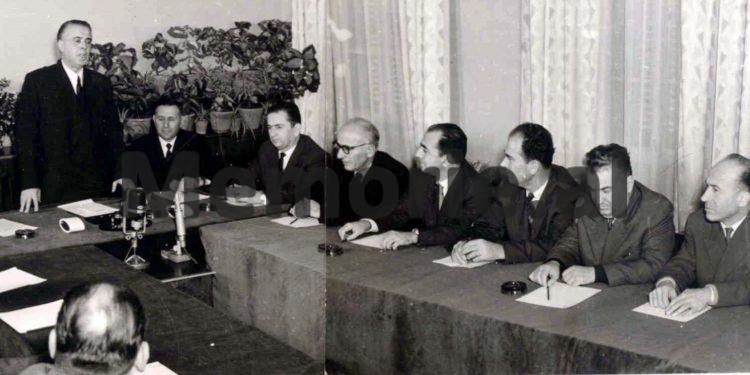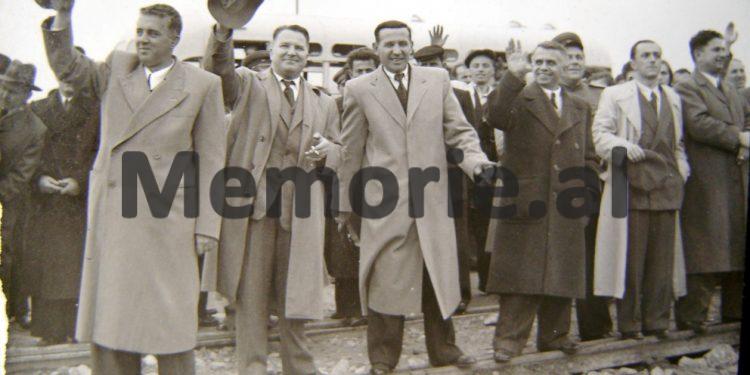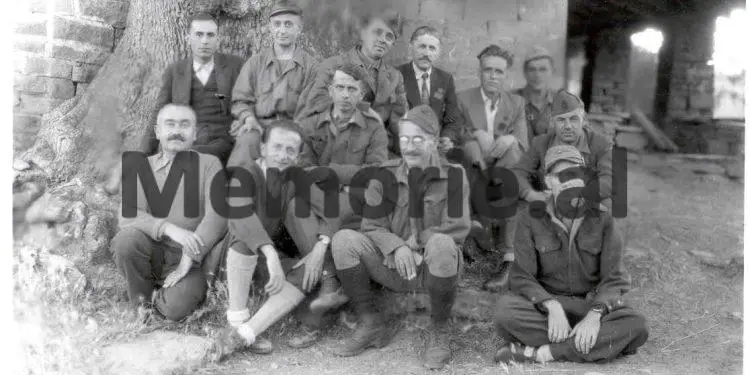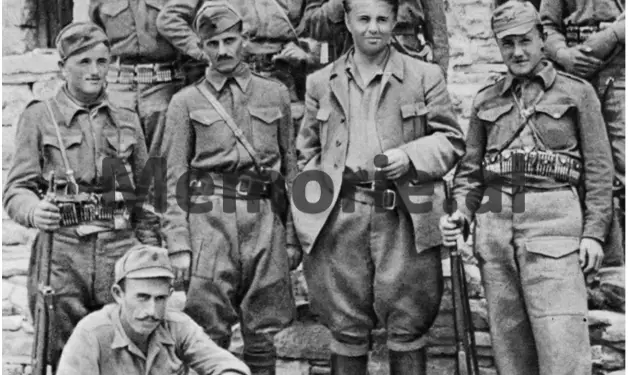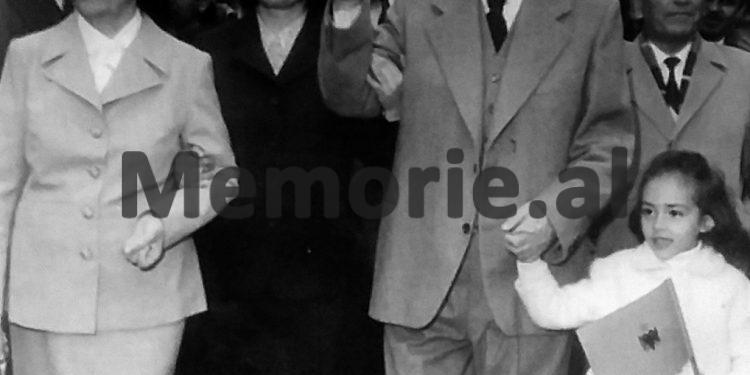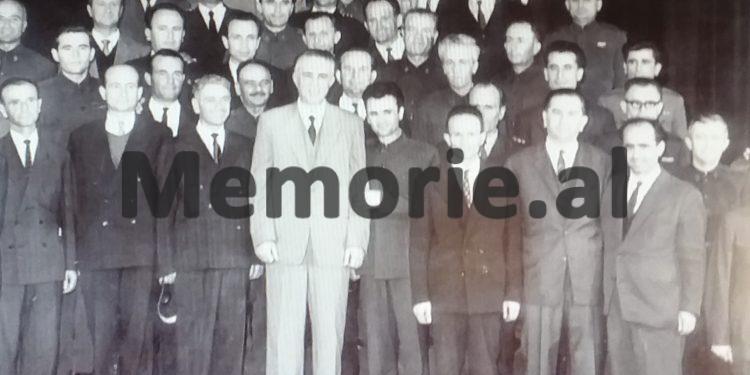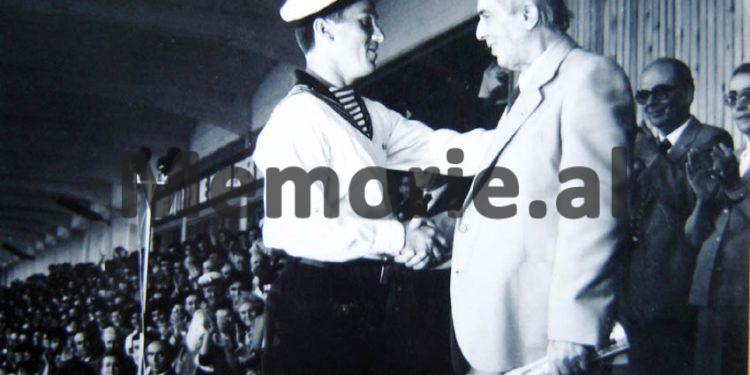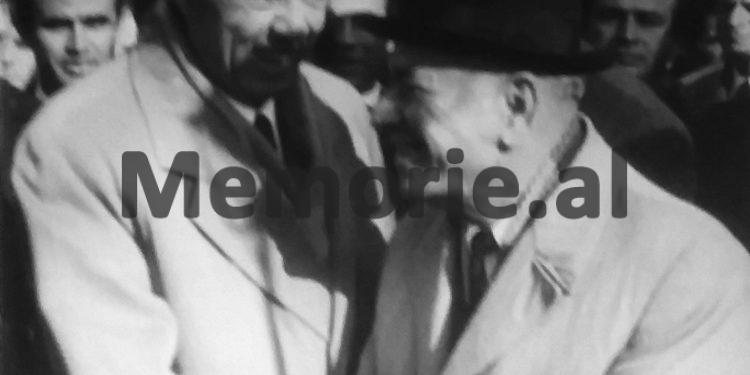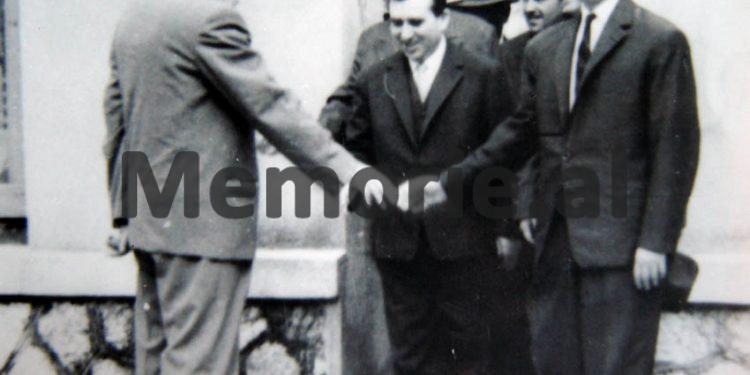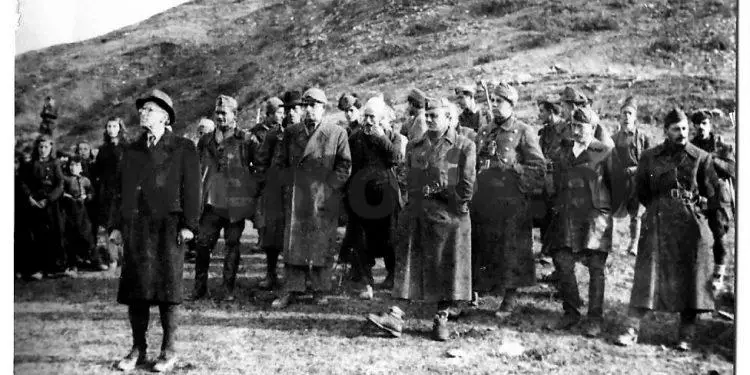Dashnor Kaloçi
Memorie.al publishes some unknown stories and events of Enver Hoxha from the period of the War and then, witnessed by his former bodyguard, Qazim Malaj, originally from the village of Tërbaç in Vlora, who in 1943 was appointed by Hysni Kapo to serve next to the “Commander” who was saved by a German officer held near the General Staff and tried to enter with an automatic weapon in the room where Enver slept, Spiro Moisiu and all other members of the Staff.
Enver’s gratitude for the “bravery of Tërbaç” that saved his life, which kept him the commander of his guards until 1974, when he retired, which testifies to some of the most difficult events that the “Commander” has gone through, that from the period of Koci Xoxa who tried to physically eliminate her, she with the submarines of the Pashaliman Base in 1961, where he after receiving the telegram sent to him by Beqir Balluku from the meeting of the Warsaw Pact and got up in the late hours of the night shouting Hysni Kapos and Ramiz Alia to go urgently to Vlora, etc., until the event of 1974, when Todi Lubonja and Fadil Paçrami were sentenced and Ramiz came and knelt down to Nexhmija begging him to forgive him Enver … ?!
“In February 1944, when the General Staff of the National Liberation Army was in the village of Helmës in Skrapar, Spiro Moisiu and Enver Hoxha informed us to take measures as a German general accompanied by two other officers would come for talks. After several hours of talks, Commander-in-Chief Spiro Moisiu, along with Enver Hoxha and other members of the Staff, hosted a dinner in honor of the German general. The next morning, the German general and the two escort officers took the road to where they had come from, accompanied by our partisan guards. After their escape, Spiro Moisiu ordered the Headquarters to be moved from Helmësi to the village of Panarit in Korça, as he feared that the Germans would bomb there. A few days later, as we were leaving the village of Panarit, a German officer and a Czech brought us back to the Fifth Assault Brigade in Rradhimë, Vlora. After I had brought the bread to the room where we were guarding it in the evening, around 3 o’clock on the night of April 20, 1944, I heard a noise and went to check it. After I asked him in Italian if there was any need, he told me he wanted to go to the bathroom because he had severe abdominal pain. As I accompanied him from behind and was waiting for him to get out of there, he suddenly hit me on the head with a water cannon and I immediately fell to the ground. The moment I was lying down and covered in blood flowing down my throat, he ran to the end of the corridor where he grabbed a machine gun which had been left hanging by Ymer Dishnica, who had worked writing until recently. After snatching the machine gun, he turned back and climbed the stairs to the second floor where Enver Hoxha, Spiro Moisiu, and all the other members of the Staff were sleeping, who had been meeting until late. This is how Qazim Malaj, Enver Hoxha’s former personal bodyguard, originally from the village of Tërbaç in the Vlora district, recalled that distant event that took place at midnight on April 20, 1944, when he saved the life of his boss, or “Commander. ”As it was called at that time and then Enver Hoxha until he was alive. In addition, Qazim Mallaj testified to some of the most important events of the 25-year period he spent with the communist leader of Albania, until the day he retired.
But who is Qazim Malaj, what is his past and how was he appointed to the position of Chief of Guards at the General Staff? How does he remember the first meeting with Enver Hoxha and Spiro Moisiu, and what did Enver tell him when he learned that he was from the village of Tërbaç in Hysni Kapos? What was the real mission of the German general and his two companions who met Enver Hoxha at the General Staff in the village of Helma in Skrapar, and why did Enver have dinner in their honor? Who was the German reconnaissance officer and the Czech who surrendered himself to the Fifth Assault Brigade in the village of Rradhimë in Vlora, and why were they sent to the General Staff in the village of Panarit? How did he manage to hit Qazim Malaj and kidnap Ymer Dishnica’s machine gun to climb to the second floor where Enver Hoxha slept with the other members of the Staff? What did Enver Hoxha say the next day in front of the entire Headquarters, Qazimi, and what other tasks did he assign to them after that event? How did Qazimi escort Yugoslav emissary Dusan Mugosha to Belgrade, and how was he rewarded by Enver Hoxha? What are the most important events that Qazim Malaj remembers during the 25-year period he served as head of the guards near Enver Hoxha’s villa and how does he remember the 1961 event when Enver Hoxha was informed that the Russians were abducting submarines from Pasha-Limani? Why did Enver break the windows of the room with his fists after receiving the letter sent to him by Beqir Balluku from the Warsaw Pact and why did he shout at Hysni Kapos and Mehmet Shehu? Why did Ramiz Alia fall on his knees to Nexhmije Hoxha in 1973 when Todi Lubonja and Fadil Paçrami were convicted, and why did he beg her to tell Enver Hoxha? Regarding these mysteries and other events and facts, from the life of the former senior communist leader of Albania, we know interviews that we received a few years ago, Mr. Qazim Malaj, one of the senior military officers who served with Enver Hoxha for a quarter of a century.
Mr. Qazim, when did you first go to the General Staff and how do you remember the meeting with Enver Hoxha?
I went to the General Staff in early December 1943, and at that time the Headquarters was located in the village of Panarit in the Korça district. At the time I went to Panarit, Enver Hoxha was not there, as he, along with several other comrades of the Staff, was surrounded by the Germans somewhere in the province of Martanesh.
Who did you meet at the General Staff and who was the man who commanded there?
From the day I showed up at the Headquarters, I met with Spiro Moisiu, who was the Commander-in-Chief, who received me very well, and after communicating to me the duty of the guard in charge, explained to me everything I would do while on duty. my. There in the Headquarters, only Spiro Moisiu commanded and everyone obeyed his orders?
Even Enver Hoxha was commanded by Spiro Moisiu?
Yes, even Enver Hoxha was commanded by Spiro Moisiu, because he was the Commander-in-Chief and was the only one who learned of the army’s affairs, as he had been a career soldier during the period of Zog’s Monarchy. Enver Hoxha was close to the Headquarters, but at that time he was responsible only for political affairs and not military ones, for which only Spiro Moisiu was competent and ordered.
How do you remember the first meeting with Enver Hoxha?
As I said above, I met Enver sometime after I went to the Headquarters when he returned from the Martanesh area where he had been surrounded by some other friends. When we met, he asked me where I was from, and when I told him from Tërbaçi, his face lit up and he said, “You are from the village of Hysni Kapos.” During that conversation he warned me why I had gotten married so quickly and I replied that: my father had forced me. He then told me to come up with three stone cases, which he shot all three with a revolver. After he shot them himself, he told me to shoot, and he and I laughed when I shot only twice, telling me it had passed.
What do you remember from that time when you were with the General Staff?
One of the most difficult events I went through at the time was with the German reconnaissance officer, who came to the headquarters when we were in Panarit, shortly after we left Helmis where talks were held with the German general.
Why did the German officer come to the Headquarters and who did he meet there?
Back in February 1944, when the General Staff was in the village of Helma in Skrapar, Spiro Moisiu and Enver Hoxha informed us to take measures to receive a German general and two other officers accompanying him who would come there for talks. . After the three of them came and held talks for several hours with Spiro Moisiu, Enver Hoxha and other members of the Staff, a dinner was held in their honor, and the next morning they left where they had come accompanied by partisan guards. One day after they left, Spiro Moisiu ordered the Headquarters to be moved from Helmësi to the village of Panarit in Korça, as there were suspicions that the Germans would bomb the village after learning of its location.
Did the Germans bomb?
Yes, that day the Germans bombed with aircraft and artillery, but we did not suffer any damage, as we had left from there.
What is the problem with the German reconnaissance officer mentioned above?
In March 1944, a German officer and another of Czech descent voluntarily surrendered to the Fifth Assault Brigade in the village of Rradhimë in Vlora. After being escorted to the Fifth Brigade Headquarters, they stated that they wished to remain with the partisan forces, but insisted that they be given the opportunity to talk to the top leadership of the General Staff. After that, they were allowed and at the beginning of April 1944, they came to the Headquarters located in the village of Panarit in Korça.
Why did they keep the German officer at the General Staff, and what was the truth of his voluntary surrender to the Fifth Brigade?
As I said above, after that German officer along with his colleague who was said to be of Czech descent, surrendered to the Fifth Brigade, they insisted on meeting with the Chiefs of Staff. In fact, they were not just prisoners of war, but their surrender was a game of ‘German intelligence’, which I will talk about below. The staff accepted their request and allowed them to come. I do not know what they talked about with the senior partisan leadership led by Spiro Moisiu and Enver Hoxha, but at that time, it was as a rule of war that the captives kept them to be exchanged later. This was probably the reason why he was kept near the Headquarters.
The two captive officers kept them near the Headquarters?
No, only the German officer was kept near the Headquarters, because the Czech officer, who was said to be his translator and knew several foreign languages, was not detained and was taken away elsewhere.
How long did that officer stay near the Headquarters and how was he treated there?
The German officer was held at the General Staff until the day he had to, and during all those days he was treated very well. We kept him guarded in a room on the first floor of the house where the Headquarters was located in Panarit, and the food I brought to him was the same as that of all the members of the Headquarters.
What misfortune did he have, and what was that German officer really like?
As I said above, that officer was not just a prisoner of war, but he was a major German reconnaissance major, and his surrender was a game of theirs in order to uncover the location of the Staff and everything else you might need. These things were not known from the beginning, but there were doubts about it, so we kept it guarded. Ten days after his arrival at the Headquarters, around midnight on April 20, 1944, I heard voices and when I was taken to see what that noise was, the partisan guard guarding the German informed me that he was looking for something. . I asked him in Italian if there was any need, and he replied that he had severe abdominal pain and wanted to go to the bathroom. I told him that I had given him the same food as the Headquarters and that it was not possible for him to have the pain from the spoiled food, and I told him to come after me to go out to the toilet that was at the end of the hallway on the first floor. first. As I accompanied him to the toilet and was waiting for him to come out, he shot me in the head with a water cannon, and I immediately fell to the ground. He jumped on me and asked me to grab my gun, but I wouldn’t let go, and for a few minutes we both got into a fight, rolling down the hall. Although I punched him several times in the head, he did not ask if he was very strong, and at one point he was picked up and abducted by a machine gun that had left Ymer Dishnica hanging there, who had been working until late… After snatching the machine gun, he turned around and climbed the stairs to the second floor where Enver Hoxha, Spiro Moisiu and all the other members of the staff who had had a meeting until three o’clock at night were sleeping. As he climbed the stairs, as I was drowning in blood, I gathered my strength and threw myself into the gorge, pulling him down the stairs into the hallway. Although I put him down once, he rescued me from his hands again and as he was leaving he raised his machine gun to shoot at me. I also pointed the rifle at them and we shot at each other at the same time. His bullets hit me hard on the head, and I shot him straight in the body, and while he was still standing, I approached him and hit him on the head with a rifle. While the rifle was broken in two and he fell to the ground with a brain that came out of his cracked skull, Enver Hoxha came up the stairs with a revolver in his hand and said: “What is this, Qazim Tërbaçi”.
What happened next?
After Enver, all the other members of the Staff came out and asked me what had happened. As I explained the incident, other partisan guards took the body of the German officer and took him out of the house.
Did those of the Staff who saved your life thank you?
The next day, after Spiro Moisiu gathered the entire Headquarters, Enver Hoxha thanked me on their behalf, saying: “Bravo, man of Tërbaç, who saved our lives, you were brave and remain brave.” Then he gave me a revolver and a machine gun and, laughing, said, “I’m going to give these to you, to kill every German to come forward.
Was this the reason why Enver kept a guard near the Headquarters again?
From that day on, Enver told me not to part with him anymore, and he kept me close to the Headquarters as in charge of the guards, assigning me other special tasks.
What were these tasks?
Yes, one of them was the transfer of Dusan Mugosha to Yugoslavia. When he assigned me that task, he told me to choose other friends as well, because that mission was important and would last a long time. Before we left, he gave me a sum of money that we would need for the trip. My three other friends and I escorted Dusan to Belgrade, where he was picked up by a plane sent by Tito. We made our way to Belgrade for three months, walking on foot and out of place. When we came to Gjakova, we contacted the Radio and the Headquarters, and Enver ordered us to stay there until the situation calmed down. Sadik Bekteshi then informed me that I had been assigned the task of commanding a gang of Kosovar partisans.
How long did you stay in Gjakova?
At the head of that gang I stayed until October 1944, when during an ambush we made a German convoy, I captured three Nazi women. At that time Enver informed me to return to the Headquarters and I returned to Berat where he told me that I would continue the task I had there. When we came to Tirana with the Provisional Government, I was appointed as the commander of the company in the Republic Guard, for the protection of high personalities.
How long did you stay there?
I stayed there until 1946 when I was removed by order of Koçi Xoxa and taken to a Prosecution Department against criminals from Mirdita. I was taken there to be killed. At the same time, Axhem Abazi was removed from the post of Commander of the Guard, and I saved Axhem from death because he was planned to be killed.
How did you save him?
At that time I met Nebi Malaj, who was the commander of a pursuit unit, and he told me that he had been ordered to shoot Axhem Abazi. I told her not to shoot him, but to keep him there as a courier. After that he did not shoot him and kept him there with him.
Who gave these orders?
Koci Xoxe, he gave. He took me with the Tracking Departments to kill me too. At that time when I was a guard at Enver, a meeting was held until three in the morning and there everyone supported Koci, while Enver was left alone. After that, Koci became powerful and did as he pleased. Since they could not eliminate me when I was with the pursuit, in 1947 they took me to Elbasan and there they plotted to kill me, when the weapons would be tested.
How did you escape?
I understood and was able to escape alive. After that I asked Mehmet Mulosmani that I had a friend during the war and he allowed me to come to Tirana to continue the United School of Officers. The plan for my murder was proved by the person in charge of it, in 1949, when Koci Xoxe was hit.
After you finished the United School where you were assigned.
Back in the 1950s, when I was finishing school, I met Haxhi Lleshi, who was the Chief of Staff of the Army in the Ministry of Defense, and he told me that Enver Hoxha wanted me to work there. I told him I was going to leave as soon as I finished school, and I did. In 1950, I went back to Enver Hoxha with the duty of guard officer and I had the office on the first floor of his villa.
Was this the reward that Enver Hoxha gave you for saving your life during the War?
Not only that. In 1947, when I fell ill with a gunshot wound to the head, Enver Hoxha took me with him on a visit to Moscow.
Was it an official visit?
No, Enver went there with his family on vacation, but he also took his companions, the barber, the cook and someone else with him. When we went to Moscow, Enver assigned me to a luxury hotel and there he called one of the best doctors of the Soviet leadership, who told him to take me to a clinic. The Russian doctor told him that it was difficult, because the hospitalization for a year that I needed cost a lot. Enver told him: “More than man costs nothing, to do as much as he can, Qazimi must recover. Afterward, Enver wanted to take me with him to the villa where he was going to spend his vacation in Soç, but I refused and returned to Albania, where the Soviet doctor sent me the medicine. After I recovered, I worked for Enver Hoxha until 1974, when I retired.
Did you go through any difficult moments during those years that you served with Enver Hoxha, or the “Commander” as he was called then?
Yes, there were difficult moments, I remember a case there in 1961 when, at 3 o’clock at night, the Minister of Foreign Affairs, Behar Shtylla, called me. He told me that a radiogram had come from Beqir Balluku who was at a meeting in the Warsaw Pact and that letter should have been given to Enver Hoxha as soon as possible. I told Behar that that job could not be done because Enver was asleep and we couldn’t get him on the phone because we didn’t have a line. Only he could take us for different orders. After that, Behari told me: “Listen, Qazim, if that letter did not go to Enver for a few minutes, we will both be thrown iron tomorrow, and maybe even worse”.
How did you react to what Behari was told?
In the room above us, a woman from Gjirokastra named Boni was sleeping, taking care of Enver’s children. I woke him up and handed him the letter, telling him to take a chance and talk to Nexhmija. As I waited, Behari called again to ask what we were doing. After that, I spoke to Bonnie again and she called Nexhmija, who went and gave the letter to Enver. After a while Enver came out on top of the stairs shouting loudly and told me where he had stayed until then that radiogram. I gathered myself and said, “Comrade Enver, that letter has stayed with you, and I have marked the time there when it came. After that he started shouting even more and punched two windows, breaking them. Meanwhile, Hysni Kapo and Ramiz Alia arrived there, but Enver turned them back, shouting: “Quickly to Vlora, to Karaburun, quickly, quickly to the submarines.” After that, he returned to his office and where we were, his voice was heard saying on the phone: “Sazani, Karaburuni, all the vehicles are fast at sea. To protect submarines at all costs. After three days, Enver called me to his office and said, “Well done, Tërbaç’s husband, for telling me the truth,” and grabbed me by the neck.
Who were the closest people to Enver during the time you served at his villa?
Hysni Kapo and Gogo Nushi. Hysni entered Enver day and night without asking anyone. Only he had that right. Enver died for Hysni. When Hysni died, Enver came out on the balcony and cried like a child.
What if Ramiz Alia was coming to Enver at that time?
No, it was not Ramiz’s turn to come to Enver Hoxha. He came late when he became stronger.
Do you remember any meeting of Enver with Ramiz?
I remember the time when Todi Lubonja and Fadil Paçrami were beaten. Ramiz Alia was also criticized at the meeting, to which Enver told him he would be held accountable. That night Ramiz came and met Nexhmija. He knelt on the ground in front of her, weeping, and said, “Please tell Enver to give me his hand again.” After that, Nexhmija went and prayed to Enver and he forgave Ramiz.
Has Enver ever remembered the event that saved his life during the war?
Yes, when his mother (Anne) died, I went to comfort him with my wife. There we found some ambassadors, and Enver said to them, “Look at this man. This is Qazim Tërbaçi, who saved our lives during the war “and told them the whole story, saying that: to keep the German officer there, he had suggested to a friend of the Staff, who later became an enemy.
How long did you serve in that assignment?
Until 1974 when I retired
When you retired, did you meet Enver again?
I met during some of his visits to Tirana, but he was constantly interested in me. When Enver died, I went for comfort and after kissing him on the forehead, I knelt on the ground. I then forced the officers to meet with Nexhmija and told her to embalm Enver and not bury him. Yes, Nexhmija told me that Enver had left it all in writing what would happen to him after his death./Memorie.al




